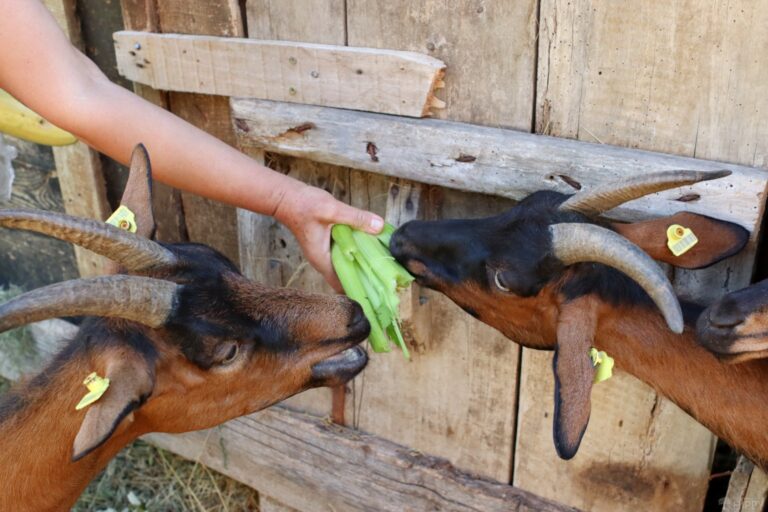Goats need a mixture of grasses, leaves, roots, hay, bark, and grains to stay healthy and well-nourished. This is important for good digestion. But sometimes, something that tastes good is safe… until it is not.

Can goats eat celery, for instance?
Yes, in moderation, goats can eat celery. Celery is a good source of fiber, B vitamins, folate, magnesium, and potassium. However, they also contain furocoumarins, which can be deadly to goats if too much is consumed.
Most goats will love this crunchy, tasty treat. Some not so much, but celery will help keep them healthy and keep them hydrated.
Here is everything you need to know about feeding celery to your goats…
The Benefits of Celery in a Goats Diet
There are several benefits eating celery can have for goats.
Vitamin A: maintains their epithelial development and strengthens their immune system.
Calcium: is essential to good bone and muscle development. It also is essential to the bodies’ nervous and cardiovascular functions, and it is important to prevent painful illnesses that lead to stiff, swollen joints, and poor growth and development.
Magnesium: helps your goats metabolize carbs and fat to maintain good body weight. It is a great source of energy production.
Iron: is needed to ensure the production of red blood cells and to transport oxygen through the blood.
Phosphorous: improves the function of enzymes, improves their energy metabolism, and helps to maintain a healthy acid-base balance in their bodies.
Vitamin B (B1, B2, B3, B5, and B6): are all of the utmost importance to a healthy nervous system. It is also very much needed for a good metabolism, and healthy skin.
Vitamin C: is a good antioxidant and supports the immune system, helping your goats fight off illnesses.
Manganese: pregnant does need manganese to produce healthy kids with good bone, brain, and organ development. Goats are prone to stillbirths if they do not have a healthy amount of manganese in their diets.
Protein: is essential to maintaining good growth, reproduction, lactation, and a strong immune system.
Fiber: is of paramount importance to maintain good gut health and to improve the quality and quantity of milk produced.
Potassium: helps metabolize food, breaking it down and absorbing all the nutrients.
Copper: is important to the development of healthy antibodies and white blood cells, and to the production of antioxidant enzymes.
Vitamin E: is needed for a strong immune system, good growth, and for healthy reproduction.
Vitamin K: affects the blood’s ability to clot.
Sodium: regulates appetite and overall condition by buffering pH levels.
Folate (Vitamin B9): synthesizes and repairs DNA and ensures healthy liver function.
Water: celery is 95% water. Eating celery will help maintain a healthy digestive system and keep your goats hydrated on hot days.
The Risks of Too Much Celery in a Goat’s Diet
While celery is a great source of nutrients for goats, it does have some serious risks if given too much.
The most important risk to your goats relates to a group of organic chemical compounds called furocoumarins. Specifically, celery has high levels of bergapten and xanthotoxin.
Furocoumarins lead to a disease called photosensitization. This disease affects the epidermal layer making the skin sensitive to UV rays – especially affecting areas of skin that are not covered with hair (lips, eyes, teats, and udder). Symptoms appear 10 days after bingeing.
It leads to painful blisters on the skin when exposed to the sun. They will seek shelter from the sun and scratch or rub affected areas.
Ultimately, the disease can lead to a very painful death.
If given too much celery, your goats may develop bloating, gas, constipation, and diarrhea.
If given whole, celery does carry the risk of choking. Chop it into small pieces to make it easy to chew and swallow.
Can Goats Eat All Parts of Celery Plants?
Leaves
Leaves are a tasty treat but should definitely not be given too often. Celery leaves can lead to sensitivity and painful blistering of the skin and the mucus membranes.
It is better not to feed your goats the leaves to avoid these issues.
Stalks
Some goats like celery, some do not; the stalks are safe to feed.
Goats are very curious and will explore different tastes. If you cut the stalks into pieces your goats will eat them, mostly because it is an interesting item on the menu.
If you offer the whole stalk, they may take one bite and decide it is not what they want.
It is safe for your goats to eat celery stalks in moderation.
Celery Juice
Juicing fruit and vegetables can be a dangerous game.
Sugar and toxins like furocoumarins are more concentrated in juice form. This means that while they pose an added risk of sugar-related disease, content-related diseases are also so much more of a threat to your goat’s health.
Roots
The bulbous roots of celery plants are a tasty, moisture-rich treat for goats. The roots are not very deep and are, therefore, easy to dig up.
Goats are very intelligent and understand the cause-and-effect value of roots. The labor exerted by digging the roots free are validated by the sweet, juicy, tasty roots.
Seeds
While slightly bitter, celery seeds are healthy for your goats to consume – in moderation.
Preparing Celery for Goats
Before giving your goats celery, take time to thoroughly wash the celery to get rid of herbicides, pesticides, chemicals, and toxins.
Goats do struggle to bite and chew thicker pieces of celery. To resolve this issue, simply cut the celery into small, more manageable pieces (about the length of your thumb) before giving it to your goats.
Feeding Raw Celery
Feeding raw celery to goats is much more beneficial than cooking the celery for them. Cooking drains all the nutrients found in raw celery.
Wash the celery before giving it to your goats to get rid of all harmful chemicals or contaminants.
Feeding Your Goats Cooked Celery
If you have cooked celery that has not been cooked with salt, onions, garlic, dairy products, or store-bought spices it is safe to feed to your goats.
You should still feed your goats cooked celery in moderation.
How Much Celery can a Goat Safely Eat?
Do not feed celery in bunches or mixed in with other food – unless each goat is fed from its own food bowl – presenting a large amount of celery intended for the whole herd can lead to toxic levels of furocoumarins.
Celery should make up no more than 25% of your goat’s daily feed.
It is safer to only feed 1 to 2 stalks a day per goat.
I highly recommend hand-feeding all treats to make sure that one greedy goat does not eat his share and the share of a goat that does not like celery.
Can Baby Goats Eat Celery?
Moderation is most important when feeding baby goats celery. Their digestive systems are not strong enough to tolerate most treats. Given the dangers of furocoumarins, the longer you wait to introduce your kids to celery the better.
Do not give kids any treat before they are completely weaned from their moms. Start by giving them one small piece of celery (smaller than your thumb) and gradually increase this over a period of months.
Watch them carefully and immediately seek help from your veterinarian if you see symptoms of furocoumarins.
Healthy Alternatives
There are so many healthy treats that are not toxic. Instead of reaching for treats that carry potentially deadly side effects, choose a healthier treat (most fruit and vegetables have only sugar content to worry about).
Here are some healthy options:
- Carrots
- Bananas
- Pumpkin
- Squash
- Watermelon
- Peaches
- Pears
This is… My Final Answer
While technically celery is safe for goats to eat, it is not top of my list of treats for goats. While sugar is a hazard in all fruit and vegetables, never choose a treat based on sugar content alone.
Most people have never heard of furocoumarins, and yet they are deadly to goats.
My advice to you is do not feed your goat’s celery unless you are monitoring them and feeding them in moderation. It is definitely not a good idea to grow celery; you never know when your hungry goats will get into your veggie garden.

Di-Anne Devenish Seebregts was raised in an environment where daily life consisted of hiking, environmental conservation, growing fruit and vegetables, and raising poultry for meat and eggs.
She combined her passion for the writing word with her love of the pride that comes with not relying on others. She raised three children (who are now adults) to value the environment, and understand the value of being self-sufficient.
Find out more about Di-Anne on our About Us page.
